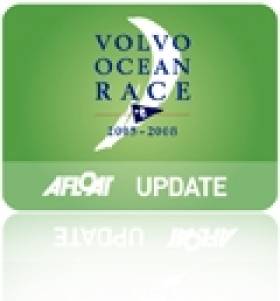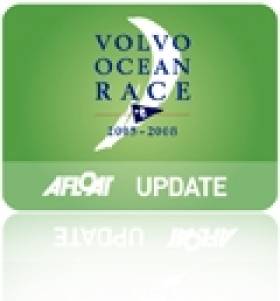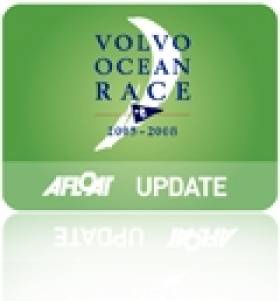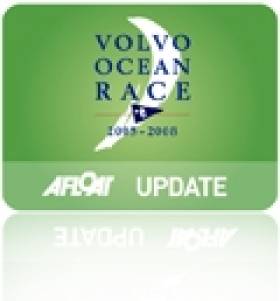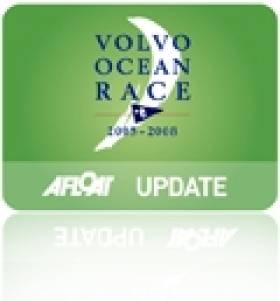Displaying items by tag: Itajaí
Slow Progress From Itajaí In Volvo Ocean Race Leg 6
#VOR - More than 36 hours into Leg 6 of the Volvo Ocean Race 2014-15 and the fleet is making slow but steady progress east from Itajaí in Brazil.
Indeed, as of 7.40am this morning (Tuesday 21 April) only a little over three nautical miles separated the first-place Team Alvimedica from the back-marking Team Brunel, winners of Sunday's in-port race.
At present the six racing boats are almost due south of Cabo Frio, near Rio de Janeiro.
And the fleet will continue sailing east into the Atlantic for some time till they can catch the right winds for the swing northwards then northwest towards the Caribbean.
According to race meteorologist Gonzalo Infante, there are good offshore options for the teams to consider on this 5,000-nautical-mile coastal leg towards Newport in Rhode Island, but a number of obstacles, such as a return to the Doldrums. lie in wait.
In the meantime – as the boats eek out as much power from their sails as they can, finally reaching a steady 10 knots over the first night and currently averaging 12 knots across the fleet – those challenges will feel like a long way off yet.
#VOR - Team Vestas Wind aren't quite ready to rejoin the Volvo Ocean Race after their mishap in the Indian Ocean last November.
But their name loomed large over yesterday's (Saturday 18 April) in-port race at Itajaí, sailed in far-too-calm conditions that tested the six competing yachts to the limit.
As the official VOR website reports, Team Brunel claimed top honours in what was an "excruciatingly but fascinatingly drawn-out" race.
The win also puts them ahead of the field in the overall standings – but only by one point on closest rivals Abu Dhabi Ocean Racing, who were first to cross the line into the Brazilian port on 5 April.
MAPFRE – who were docked two points last Thursday (16 April) by the ISAF-appointed independent duty for repairs against the rules during Leg 5 – were the first to catch what little wind there was to be had, after an all-nighter to shore up their weakened mast.
Abu Dhabi, meanwhile, duelled with the women of Team SCA, who have been strong in this race's in-port battles. However, a penalty for fouling Team Brunel put paid to the ladies' efforts.
The final showdown was between Abu Dhabi, the Chinese contingent Dongfeng Race Team and the Dutch boat of Team Brunel – and it was to be the latter that pipped the trio at the post.
As for the absent Team Vestas Wind? Progress is being made at their Italian shipyard, with skipper Chris Nicholson saying that "90% of the parts are together".
That's not the same as having a finished boat that's ready to race, of course, as "you’ve got to remind yourself just how complex these boats are, the amount of hydraulics and ropes that goes on – it’s all happening as we speak," he told the VOR website in Itajaí.
But Nicholson is confident that, should plans continue as they are, the team will get "three days on the water before racing" when the fleet assembles in Lisbon for the penultimate leg.
Newport Makes It Six For VOR 2014-15 Host Ports
#VOR - Newport in Rhode Island has been announced as the latest stopover for the next edition of the Volvo Ocean Race in 2014-15.
The popular sailing base in the 'Ocean State' will be the North American port on the race route for its 12th running as the end point of the leg from Itajaí in Brazil, and is hosting the event for the first time.
"It's about time the race came to the city of Newport and we are looking forward to a real festival that will delight and inspire sailing fans and those who are new to the sport," said Volvo Ocean Race CEO Knut Frostad at the announcement.
Conveniently located between the Irish-American hotspots of New York City and Boston, the crowds in attendance are sure to feature a prominent 'green' element.
As reported at the weekend on Afloat.ie, Gothenburg in Sweden has been awarded the honour of hosting the VOR finale, much to the disappointment of Galwegians after last summer's successful event.
Brazil Now A Double Host for 2014-15 Volvo Ocean Race
#VOR - Brazil will now have two stops on the route for the 12th edition of the Volvo Ocean Race as Itajaí joins the previously announced Recife on the list of host ports.
Itajaí, in the state of Santa Catarina, staged a memorable stopover in the 2011-12 edition with huge crowds packing the Race Village throughout, and the port’s return to the route means the south of Brazil is joining the north east in the race.
As previously reported on Afloat.ie, a boat backed by the state of Pernambuco was confirmed at last week’s announcement which race organisers say will ensure a distinct Brazilian flavour for the race's 12th edition in 2014-15, at a time when the focus of world sport will be on the country.
"Making two stops in Brazil makes perfect sense at a time when the country will be the beating heart of sport between soccer's World Cup in 2014 and the Rio Olympic Games in 2016," said Volvo Ocean Race CEO Knut Frostad.
"We are thrilled to be going back to Itajaí, which proved to be one of the most successful stopovers of the last edition with a rhythm all of its own.
"We had huge numbers of fans in attendance on all the key dates and with the support of the city and the region we're looking forward to breaking those records next time."
Once again, Itajaí will provide the long awaited finish line for the teams following their rounding of the iconic Cape Horn in the Southern Ocean.
"The leg through the Southern Ocean, around Cape Horn and on to Brazil, was an instant classic in the last edition," said Volvo Ocean Race COO Tom Touber, who made the announcement at the Castelo Montemar in Itajaí today (22 January).
"Going twice now to the vast, diverse and sports-mad country of Brazil is a privilege for us."
Speaking at the announcement, Itajaí mayor Jandir Bellini added: "Hosting the Volvo Ocean Race once again is proof that Itajaí is capable of staging the biggest events in the world.
"It is our goal to confirm Itajaí as a national capital of sailing."
Exact dates of the Itajaí stopover will be announced next month. The remainder of the route for the 12th edition of the Volvo Ocean race will be revealed over the coming weeks.
Groupama Try Out a New Watch System
#VOLVO OCEAN RACE - Has the Groupama sailing team adopted a new simplified watch system, keeping just one man on deck to handle the vessel - as demonstrated by Ireland's Damian Foxall in the video above?
Don't worry - it's just a prank for April Fool's Day yesterday!
The yacht and its full compliment of crew have rounded Cape Horn and are currently in overall second place as the Volvo Ocean Race fleet heads to Itajaí in Brazil on the fifth leg and longest passage of the race.
Groupama and PUMA are currently battling for first place on the leg, with Telefónica hot on their heels after making up 180 miles in just 36 hours with speeds near double those of the frontrunners.



























